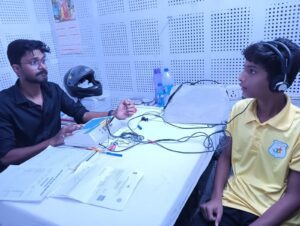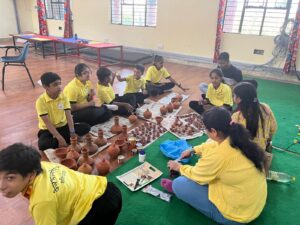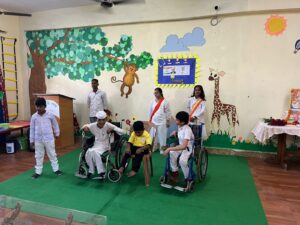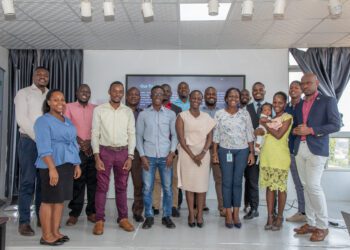
Rohit Kushwaha, an Aspire Leaders Program alumnus and Community Action Award winner, has grown tremendously as a leader. Originally from Ghaziabd, Uttar Pradesh, India, he overcame his anxiety as a teenager and now leads his own community project. This project, funded by Aspire Institute, impacts youth with disabilities in Ghaziabad.
Early Obstacles and Discovering a Passion for Community Engagement
Kushwaha’s family moved to Bihar when he was young, and he had to adjust to a more urban environment. He attended a small school and began experiencing anxiety at a young age. This escalated in 6th grade, making it difficult for him to socialize in large groups.
“I couldn’t go into crowded places,” he explained. “I can speak a lot better now.”
After moving to Ingraham English School, Kushwaha found a passion for education and community engagement. This school had a larger student body and was more competitive. He excelled academically, joined extracurricular activities, and gained more confidence in networking and socializing.
“I received a lot of exposure in high school,” he said. “We traveled to various colleges for inter school competitions and there was lots to learn.”
Being in this larger and livelier environment allowed him to feel confident in socializing in larger communities.
“If you don’t try to face it, it’s always going to be there,” Kushwaha said. “Anytime there was an event happening, I would go out of my way to attend.”
In the 11th grade, he began acting as the organizer and master of ceremonies for all school events. This was the first time he held a microphone or spoke in a public setting. By 12th grade, he served as head boy at his school, showcasing his growth over the years.
Unlocking More Opportunities Through the Aspire Leaders Program
During his first year of university at Raj Kumar Goel Institute of Technology, Kushwaha learned about the Aspire Leaders Program. He described the program as life-changing, connecting him with like-minded individuals and providing a unique network and educational experience.
“I met a lot of people with the same kind of mindset as me,” he explained. “Young people willing to grow and learn and contribute something to society. It was a great community—especially the guest lectures and various sessions we got to attend.”
Kushwaha noted that the immersive experience that the Aspire Leaders Program offered was something lacking in his education at home. He enjoyed the new way of learning and continues to use Aspire teaching methods and case studies when explaining things to his classmates.
Community Impact and Pivoting for Success

After completing the Aspire Leaders Program, Kushwaha applied for – and won – a Community Action Award, which provides a grant to pursue a social impact project in his community. His project aims to enable youth with disabilities to live financially independent lives through vocational skills building and placement support, culminating in the opening of a skill development center in Ghaziabad.
During his senior year of high school, Kushwaha, his classmates, and a teacher who inspired him to pursue impact projects in social work, started their own organization. They partnered with a special Ingraham branch that taught youth with disabilities, specifically those who are deaf and mute, in Ghaziabad.
“We saw that people weren’t getting their disability certificates [nor] getting the support they needed to succeed, so we focused on that,” he said. “Slowly, we saw just how much needs to be done for disabled people.”
He designed his Community Action Award project with this work in mind. He hopes to create a scalable model to assist both youth with disabilities – and adults – in securing sustainable jobs.

Despite facing challenges receiving funds through his partner organization, Kushwaha and his team persevered. They pivoted their model and secured a physical space at a neighboring engineering college. They worked to house their school here and make the school accessible through scholarships.
“The schools for individuals with disabilities just aren’t accessible,” he explained. “Our school allows people who can pay to attend but makes it free of cost to those who cannot.”
Their school serves students with a variety of disabilities and hires qualified teachers certified with degrees in special education.
Future Goals and Continuing Impact
Kushwaha is in his third year of university pursuing engineering and computer science at Raj Kumar Goel Institute of Technology.
Looking forward, he plans to secure a job at a technology company and create employment opportunities for others.
“I want to create employment, not just be employed,” he said.
He will also continue to work on his community impact project and school, hosting fundraisers and supporting students with disabilities. He ultimately plans to address disabilities early on, providing therapy and support that will help children succeed academically and in the professional world.

“The reality is that there are a lot of disabilities that can and should be addressed early on,” he explained. “But, what usually happens is that parents don’t detect it, or they do but can’t afford the therapy. We exist to help those kids early on so that they can succeed.”
The most rewarding part of this work is witnessing the happiness of children learning in a safe and supportive environment at his school. It’s these children who keep him motivated and determined to continue his impactful work.
Perseverance as a Community Leader and Inspiring Others to Join Aspire
Kushwaha hopes others join the Aspire Leaders Program and persevere as they strive to make an impact in their communities around the world.
He emphasized the importance of pressure testing your plan for viability.
“If it’s a thoroughly thought through project, you should be able to detect where it might go sideways,” he said. “As soon as you see those signs, it’s time to design a back up plan.”
With this in mind, Kushwaha and his team detected these problems early on and pivoted their model, resisting the urge to lose hope and quit.
“If your project isn’t working as you had hoped it would, or not living up to expectations, that is not always a bad thing,” Kushwaha recommended. “Sometimes, projects move slowly but aren’t derailing, so you don’t need to modify it. Be patient.”




